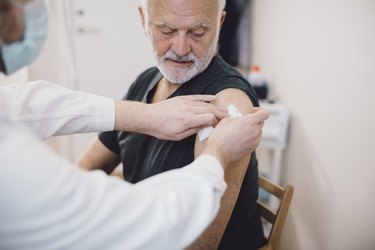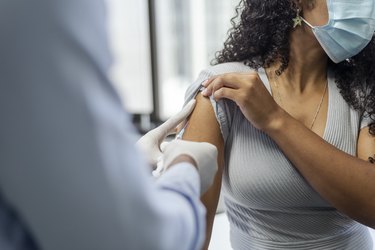
Respiratory syncytial virus, or RSV, is an upper respiratory infection that can cause serious complications, particularly for older adults and infants. But for the first time, there's a vaccine that offers significant protection.
The newly rolled-out RSV vaccines are available now, and the Centers for Disease Control and Prevention (CDC) recommends them for adults over 60 and pregnant people.
Video of the Day
Video of the Day
"RSV cases are already starting to show up in hospitals," says Mary Hopkins, MD, director of the Infectious Diseases Clinic at Tufts Medical Center in Boston, Massachusetts.
So if you're in one of those vulnerable groups, the sooner you get your shot, the better.
And if you want some more information before rolling up your sleeve, read on. Here's what infectious disease experts want you to know about the RSV vaccine for adults.
1. Getting Vaxxed Can Help You Avoid Hospitalization, Especially if You Have an Underlying Condition
RSV typically causes mild, cold-like symptoms for younger, healthy adults. But those over 60 are more prone to developing serious complications (like pneumonia) that could land you in the hospital, the CDC says.
"Last fall and winter was particularly bad. Among the elderly, we had about 160,000 hospitalizations and 10,000 deaths due to RSV," Dr. Hopkins says.
Having an underlying condition can make you particularly susceptible to problems from RSV. So getting vaccinated is especially important if you have "lung, heart or kidney disease, or diabetes," says Carlene Muto, MD, Medical Director of Infection Prevention and Control for Temple Health in Philadelphia, Pennsylvania.
The vaccine has been shown to be more than 80 percent effective at helping people avoid RSV altogether, per the CDC. And if you do end up getting sick, it'll keep your complication chances low.
"You may still get sick, but you'll have a much more mild case," Dr. Muto says.
2. Pregnant People Should Get Vaccinated in the Third Trimester
The RSV shot isn't just for older adults. People who will be 32 to 36 weeks pregnant between September and January should also get immunized, the CDC says.
Vaccination during pregnancy (at least two weeks before delivery) gives added protection to newborns, who are at high risk for RSV complications, Dr. Muto notes.
In fact, getting vaxxed against RSV during pregnancy can reduce an infant's risk of hospitalization by 57 percent in the first six months after birth, the CDC says.
3. The Vaccine Won't Make You Sick
The RSV vaccine is a recombinant protein vaccine, which means it exposes your immune system to a tiny amount of protein from the virus (similar to the seasonal flu shot).
Because you're only being exposed to one small "piece" of the virus, you can't actually become sick with RSV. Rather, the vaccine helps your immune system get familiar with the virus, so it's better equipped to fight it off if and when you encounter the real thing, according to the CDC.
Because your immune system is activated, though, you may experience some side effects — more on that next.
4. Side Effects Are Generally Mild
Some people steer clear of seasonal vaccines for fear of unpleasant side effects. But if you're at high risk for serious complications from RSV, the protection you'll get from the shot is well worth a day or two of mild discomfort, experts say.
"The side effects are similar to other vaccines. You may get a sore arm, redness at the injection site, joint pain or a headache," says Dr. Muto.
The CDC also lists fatigue, fever, nausea and diarrhea as possible side effects, but notes these shouldn't last more than a few days.
Your doctor can help you determine if you're more likely to get severe RSV depending on things like your age, health status and how likely you are to be exposed to the virus, so it's best to have a conversation with them if you're unsure.
5. It's Been Tested for Safety
Like all vaccines, the RSV vaccines were rigorously tested in clinical trials and underwent approval by the FDA before being put on the market. So you can trust it's safe, experts say.
A very small number of serious adverse events were reported in the clinical trials, including serious allergic reactions and the neurologic condition Guillain-Barre syndrome (GBS). However, it's unclear whether the vaccine caused these events or if they were due to chance, Dr. Muto notes.
Among pregnant people, there were also some reported cases of preeclampsia, or severe high blood pressure. But again, the studies couldn't tease out whether this was actually due to the vaccine.
These events aren't a reason to avoid getting vaccinated, though. If you're at high risk for severe RSV, the protective benefits of the shot are much higher than the potential risks of very rare side effects, per Yale Medicine.
But again, if you're concerned about serious side effects, talk to your doctor to determine if the shot is right for you.
6. There Are Two Vaccines, and You Can Get Either One
Similar to the Pfizer and Moderna shots for COVID, there are two different vaccines available for RSV: Arexvy, made by GSK, and Abrysvo, made by Pfizer, notes the CDC%2C%20and%20AS01E%20adjuvant.).
They're roughly equal in terms of the protection they offer, Dr. Hopkins says, so there's no need to worry about getting the "better" one.
"I'd get whichever one you can get your hands on," she says.
7. You Can Get It With Your Flu and/or COVID Shot
If you're trying to save on multiple trips to the pharmacy or doctor's office, it's fine to get your RSV shot along with your seasonal flu shot. Just know that your side effects might be slightly more than if you got the two shots separately, Dr. Muto notes. "Fever and soreness at the injection site may be increased," she says.
The RSV vaccine wasn't studied alongside the COVID-19 vaccine, so experts can't say with certainty whether it's a smart move to get both shots at once. If you're on the fence about timing, talk with your doctor.
"If it's hard to come back and get your COVID vaccine on another day, get them all the same day," recommends Dr. Hopkins.
8. You'll Be Protected for Two Seasons
One jab should cover you for the 2023-2024 and 2024-2025 cold and flu seasons, the American Medical Association (AMA) notes.
So if you get your shot now, you won't have to worry about getting another one until fall 2025.
9. If You're Unsure, Weigh the Pros and Cons With Your Doctor
While the RSV vaccine (and other seasonal shots) is generally a smart move for adults over 60 and pregnant people, no vaccine is right for everyone. For instance, you may want to steer clear if you've had an allergic reaction to past immunizations, the CDC says.
The best way to decide what's right for you? Have a conversation with your doctor.
"Health care providers may consider multiple factors when discussing RSV vaccination with patients, including whether the patient has any risk factors for severe RSV disease, the safety profile of the RSV vaccine products and the patient's preferences for RSV vaccination," says Dr. Muto.
How and Where to Get the RSV Vaccine for Adults
The RSV vaccines are now widely available at local pharmacies, public health clinics and doctor's offices, according to the CDC, so you should get vaccinated wherever is most convenient for you.
If you opt to get your shot at a pharmacy, check in with your doctor first. Some states may require a prescription for pharmacy vaccines, the CDC notes. If that's the case for your state, you'll want to get your Rx before heading over to the drug store.
- Centers for Disease Control and Prevention: "CDC Recommends RSV Vaccine For Older Adults"
- Centers for Disease Control and Prevention: "RSV Vaccination for Pregnant People"
- Centers for Disease Control and Prevention: "RSV Vaccination for Older Adults 60 Years of Age and Over"
- Centers for Disease Control and Prevention: "Frequently Asked Questions About RSV Vaccine for Adults"
- Centers for Disease Control and Prevention: "Healthcare Providers: RSV Vaccination for Adults 60 Years of Age and Over"
- U.S. Food and Drug Administration: "COVID-19, Flu and RSV"
- Yale Medicine: "Should You Get the New RSV Vaccine?"
- American Medical Association: "RSV vaccines: Questions patients may have and how to answer"
- Centers for Disease Control and Prevention: "Respiratory Syncytial Virus (RSV) Vaccine VIS"
- Centers for Disease Control and Prevention: "How to Get Your Flu, COVID-19, and RSV Vaccines This Year"
Is this an emergency? If you are experiencing serious medical symptoms, please see the National Library of Medicine’s list of signs you need emergency medical attention or call 911.


